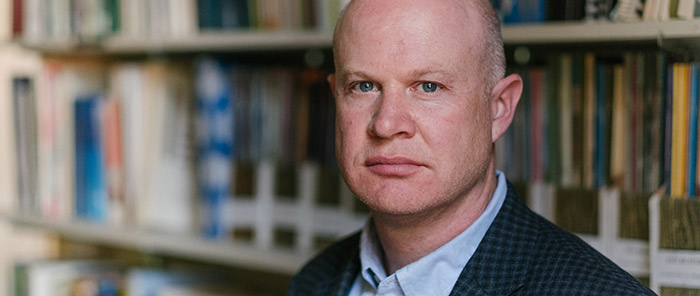On March 22, Andrew Potter, McGill graduate and former editor-in-chief of the Ottawa Citizen, resigned as director of the McGill Institute for the Study of Canada (MISC). Potter was appointed for a three-year term beginning in August 2016.
Potter’s resignation followed the publication of a column he authored in Maclean’s magazine on March 20. The article linked the shutdown of a major highway during a snowstorm on March 14 with the lack of trust within Quebec society. Since its publication, Maclean’s has clarified certain statements that were in the original article.
The column drew criticism from notable public figures, including Quebec Premier Philippe Couillard and Federal Heritage Minister Mélanie Joly. McGill subsequently posted a tweet on March 21 from its official account which stated that the university does not share Potter’s views.
The views expressed by @JAndrewPotter in the @MacleansMag article do not represent those of #McGill.
— McGill University (@mcgillu) March 21, 2017
In a resignation statement posted on his Twitter, Potter acknowledged the flaws in his article. The statement also noted that Potter will continue as an associate professor in the Faculty of Arts, which is part of his three-year contract.
“I deeply regret many aspects of the column—its sloppy use of anecdotes, its tone, and the way it comes across as deeply critical of the entire province,” Potter wrote. “That wasn’t my intention, and I am heartbroken that the situation has evolved the way it has.”
Because I can't figure out Facebook, here's my resignation statement: pic.twitter.com/kbevPAyYuz
— Andrew Potter (@jandrewpotter) March 23, 2017
Editorials and op-eds published by The Globe and Mail, the Toronto Star, and the National Post heavily criticized McGill’s tweet for reasons including that the university was stifling freedom of speech. Some suggested that Potter’s resignation was due to pressures exerted by the university’s administration.
Jonathan Kay, McGill graduate and editor-in-chief of The Walrus, reminded critics to consider the fact that Potter was not only a pundit, but also the director of a renowned institute.
“[McGill is] located within Quebec and [has] active partnerships with all kinds of government bodies and Quebec entities,” Kay wrote in an email to The McGill Tribune. “So, it's weird for [Potter] to write a column that basically says ‘Quebec blows.’ [….] Doing so greatly complicates [Potter’s] status as administrative head of this prominent body at McGill University, whose mandate touches directly on the subject of [his] column.”
A press release signed by McGill Principal and Vice Chancellor Suzanne Fortier on March 23 refuted claims that Potter was pressured to resign.
“[Potter’s] resignation provoked unfounded rumours and concerns regarding academic freedom,” Fortier wrote. “I want to assure members of the McGill community that academic freedom is a foundational principle of McGill University, as enunciated in our Senate-and Board-approved Statement of Academic Freedom.”
McGill Internal Communications Director Doug Sweet wrote in an email to The McGill Tribune that it is an important distinction that Potter signed the piece as Director of MISC. According to Sweet, academics need to distinguish when they are speaking on their own behalf and expressing their personal views.
“Had the article in question been signed by the Professor as an individual academic, the University would have had a responsibility to defend a matter of academic freedom,” Sweet wrote. “[….Potter’s] resignation from that post was not accepted because of controversy surrounding the article or whether McGill agreed with it or not; the resignation was accepted because the article’s publication had significantly hampered Professor Potter’s ability to perform his duties as Director of MISC.”
Terry Hébert, pharmacology and therapeutics professor and president of the McGill Association of University Teachers (MAUT), emphasized the importance of academics being able to express ideas without fear of repercussion from the administration.
“MAUT is always deeply concerned about academic freedom—we worked very hard to get McGill to adopt [a statement of academic freedom],” Hébert wrote in an email to The McGill Tribune. “You can bet the issue will be raised at Senate, as I will raise it myself–and I imagine many others will as well. Going forward, it would be good to hear from all parties involved as to what happened, Professor Potter included.”
Hébert was also critical of McGill’s initial response to Potter’s article.
“McGill probably should have responded by a venue other than Twitter because the issue was more complicated than a simple tweet merited,” Hébert wrote. “[The tweet] could be interpreted many ways–some innocuous, some not.”








“Had the article in question been signed by the Professor as an
individual academic, the University would have had a responsibility to
defend a matter of academic freedom,” Sweet wrote.
It would be an interesting exercise for the Tribune’s reporters to dig back through the Gazette’s archives to find the unscientific, anecdotal crap Margaret Somerville used to publish as the “director” of her essentially one-woman McGill center. The difference between Somerville’s nonsense and Potter’s is that Somerville had the good sense to target groups – women needing abortion, gays wanting to marry – that politicians weren’t going to gain votes going to bat for. In this case, McGill cravenly folded at the first stern glance from someone in a necktie.